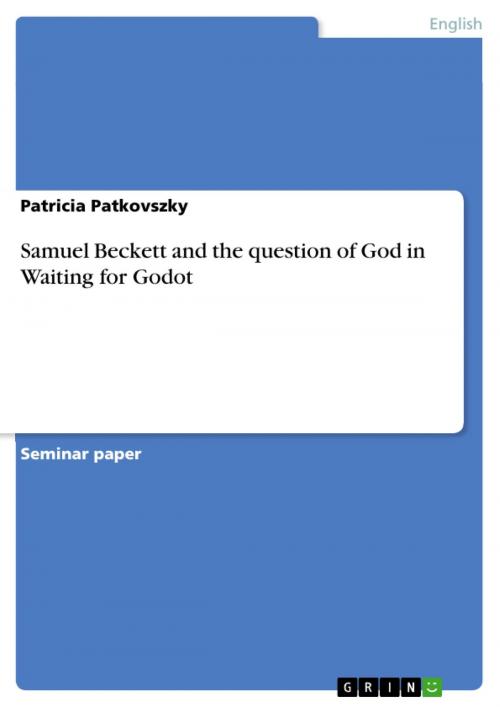Samuel Beckett and the question of God in Waiting for Godot
Fiction & Literature, Literary Theory & Criticism, British| Author: | Patricia Patkovszky | ISBN: | 9783638555739 |
| Publisher: | GRIN Verlag | Publication: | October 16, 2006 |
| Imprint: | GRIN Verlag | Language: | English |
| Author: | Patricia Patkovszky |
| ISBN: | 9783638555739 |
| Publisher: | GRIN Verlag |
| Publication: | October 16, 2006 |
| Imprint: | GRIN Verlag |
| Language: | English |
Seminar paper from the year 2006 in the subject English Language and Literature Studies - Literature, grade: 1,3, Humboldt-University of Berlin (Department of English and American Studies), course: 20th - Century Drama, 12 entries in the bibliography, language: English, abstract: On 5 January 1953 'Waiting for Godot' challenged its first theaters audience with a never seen dramatic work of art, radically different from anything shown before, the title 'referring ironically to the nonappearance of the person awaited so faithfully by the two main protagonists'. Before Beckett, drama was synonymous with action: a plot in which barely anything happens was inconceivable. Beckett is the first dramatist to focus exclusively on the act of waiting and to make this into his dominant metaphor for existence. He, at he same time, expects his audience to share that experience of waiting with Estragon and Vladimir. As Martin Esslin pointed out in 1961: 'Beckett is trying to capture the basic experience of being 'in the world', having been thrust into it without a by-your-leave, and having, somehow, to come to terms with 'being there', 'Dasein' itself, in Heidegger's sense'. Vladimir and Estragon, two tramps, are the main characters of the play. They perform on an empty stage, marked only by a single tree and a low mound, waiting for the appearance of a mysterious character named Godot. Two other men, Pozzo and Lucky, master and servant, turn up and stay with them for a while. To pass their time, they discuss their bodily handicaps, their non-fitting clothes and episodes of their life together as well as questions of theology. Godot, however, never comes; but a boy delivers the message, that he will be there the next day. Vladimir and Estragon consider leaving and even committing suicide, but they fail in doing so. Nearly the same events take place during the second act. Godot never comes and the story kind of repeats itself. Since the first performance of the play people have asked themselves: Who is Godot? Why wait for him? Why is there a Waiting for Godot? Godot... Godot... Is Godot hope? Life? A new beginning? Or death and salvation? Or is he maybe God himself? And then why does he not come? Is God dead? Lies the real catastrophe in his promise? My work therefore shall have a short look at Beckett's religious background, his relationship with religion and god; as well as the religious motives in Waiting for Godot and the question of whether Godot is God or not.
Seminar paper from the year 2006 in the subject English Language and Literature Studies - Literature, grade: 1,3, Humboldt-University of Berlin (Department of English and American Studies), course: 20th - Century Drama, 12 entries in the bibliography, language: English, abstract: On 5 January 1953 'Waiting for Godot' challenged its first theaters audience with a never seen dramatic work of art, radically different from anything shown before, the title 'referring ironically to the nonappearance of the person awaited so faithfully by the two main protagonists'. Before Beckett, drama was synonymous with action: a plot in which barely anything happens was inconceivable. Beckett is the first dramatist to focus exclusively on the act of waiting and to make this into his dominant metaphor for existence. He, at he same time, expects his audience to share that experience of waiting with Estragon and Vladimir. As Martin Esslin pointed out in 1961: 'Beckett is trying to capture the basic experience of being 'in the world', having been thrust into it without a by-your-leave, and having, somehow, to come to terms with 'being there', 'Dasein' itself, in Heidegger's sense'. Vladimir and Estragon, two tramps, are the main characters of the play. They perform on an empty stage, marked only by a single tree and a low mound, waiting for the appearance of a mysterious character named Godot. Two other men, Pozzo and Lucky, master and servant, turn up and stay with them for a while. To pass their time, they discuss their bodily handicaps, their non-fitting clothes and episodes of their life together as well as questions of theology. Godot, however, never comes; but a boy delivers the message, that he will be there the next day. Vladimir and Estragon consider leaving and even committing suicide, but they fail in doing so. Nearly the same events take place during the second act. Godot never comes and the story kind of repeats itself. Since the first performance of the play people have asked themselves: Who is Godot? Why wait for him? Why is there a Waiting for Godot? Godot... Godot... Is Godot hope? Life? A new beginning? Or death and salvation? Or is he maybe God himself? And then why does he not come? Is God dead? Lies the real catastrophe in his promise? My work therefore shall have a short look at Beckett's religious background, his relationship with religion and god; as well as the religious motives in Waiting for Godot and the question of whether Godot is God or not.















